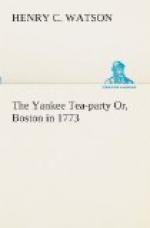“You’re right,” remarked Colson. “Few tories received quarters from the militia, and fewer of the militia asked it of the tories.”
“Herkimer should have been more cautious. Though a brave soldier, we cannot consider him a good commander,” said Pitts.
“Nay, I think he was a good commander, friend Pitts,” replied Hanson. “He was cool-headed and skilful in the hottest battle; and because he neglected sending out scouts on one occasion, you should not conclude that imprudence was part of his character.”
“But a commander, acquainted with Indian warfare, as Herkimer was, must be considered imprudent if he neglects such a common precaution as sending out scouts,” observed Kinnison.
CONCLUSION.
“Well, we won’t argue the matter now. It’s getting late, and we had better break our company,” said Warner.
“But first we’ll have a toast and a song,” replied Hand. “Fill your glasses, friends. Heaven knows if we may ever meet again; and your company has been too amusing and instructive for us to part suddenly.”
“The ale has made me feel very drowsy,” said Kinnison.
“But you may sip our toast. Gentlemen, this is the Fourth of July; and surely it becomes us, as Americans, to toast the memory of the men who, on this day, pledged their lives, their fortunes, and their sacred honors for the support of our independence. I therefore propose, ’The memory of the Signers of the Declaration of Independence. May the brightness of their fame endure as long as patriotism and the love of freedom burn in the breasts of mankind!’” exclaimed Hand. This was drunk standing, and a short silence ensued.
Hand now proposed that they should have a song, and remarked that he knew one appropriate to the occasion, which he would sing, if the old soldiers were not too weary to listen. Of course, they expressed it to be their pleasure that he should sing it, and he proceeded. “The song,” said he, “is called ‘The Last Revolutionary.’” The words were as follows:—
O! where are they—those
iron men,
Who braved the
battle’s storm of fire,
When war’s wild halo
fill’d the glen,
And lit each humble
village spire;
When hill sent back the sound
to hill,
When might was right, and
law was will!
O! where are they, whose manly
breasts
Beat back the
pride of England’s might;
Whose stalwart arm laid low
the crests
Of many an old
and valiant knight;
When evening came with murderous
flame,
And liberty was but a name?
I see them, in the distance,
form
Like spectres
on a misty shore;
Before them rolls the dreadful
storm,
And hills send
forth their rills of gore;
Around them death with lightning
breath
Is twining an immortal wreath.




